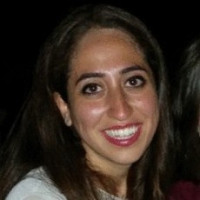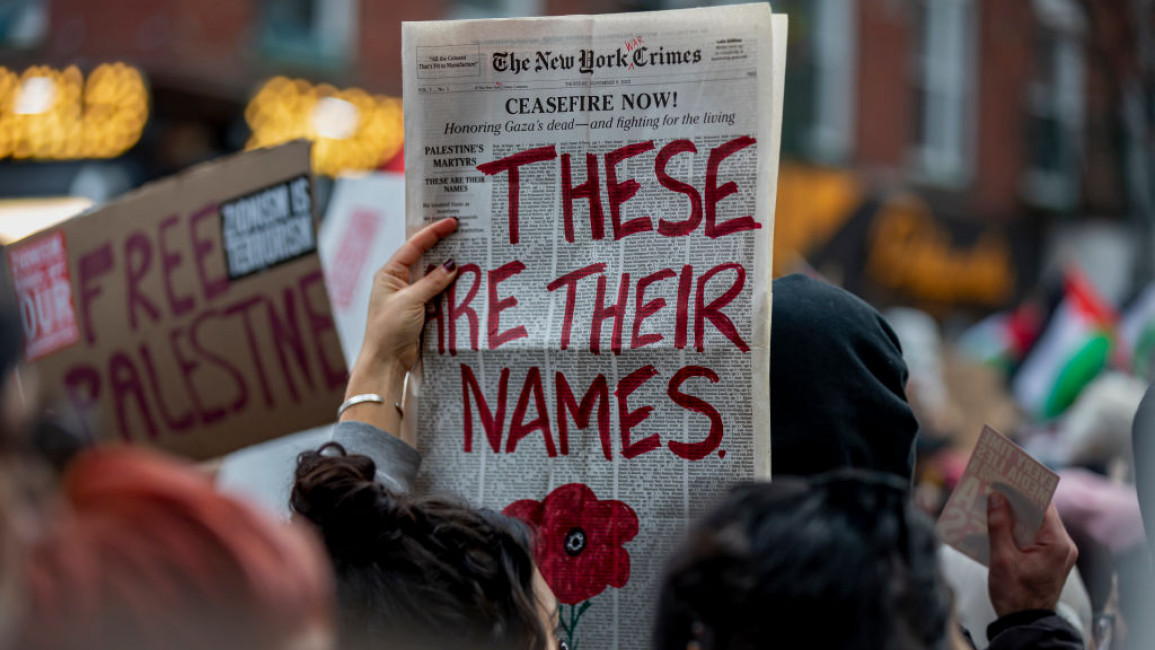
The shooting of Palestinian students in US: Politicians & the media are to blame for rising anti-Arab racism
'Hope dwells in my heart. It shines like a light in the darkness. This light cannot be smothered. It cannot be drowned out by tears and the screams of the wounded. It only grows in strength. This light can outshine hate. This light can outshine injustice. It outshines segregation and apartheid. As of Greek legend, Pandora opened a box. And when she did that, all the evil escaped. But luckily, Pandora closed the jar before hope could escape. And as long as hope stayed in that jar. Hope would never escape. So I ask you one thing, learn from that story. Learn to never give up hope. Learn to let hope give power. In the darkest of times. And let the light shine.' This is what Hisham Awartani wrote in a poem in 2015 when he was a school student in the 6th grade.
On 25 November, Awartani, along with Tahseen Ahmad and Kinnan Abdalhamid, students at Trinity College, Brown University, and Haverford College respectively, gained attention in US media. Gathering with Awartani's family during the holiday, the three 20-year-old Palestinians took a walk in his uncle's neighbourhood, wearing their Keffiyeh and conversing in a mix of Arabic and English, something many Arabs do. A shocking incident occurred when the domestic terrorist, Jason Eaton, appeared and started shooting at them, resulting in their hospitalisation.
''Media outlets and state officials have significantly contributed to enabling and justifying Israel’s genocide in Gaza. They parroted historical orientalist tropes associated with Arabs and Muslims. Falsehoods such as “beheading 40 babies,” “using civilians as human shields,” and depicting Gaza a place of lawlessness and oppression were uncritically amplified by the US media and officials to justify Israel’s genocide and its ground invasion. Large segments of society, influenced by orientalist indoctrination, believed and repeated these lies, viewing Palestinians as inherently violent and irrational.''
The trio, lifelong friends since childhood, graduated from the Ramallah Friends School in the Israel-occupied West Bank. Awartani’s mother described them as “brothers.” Abdalhamid and Awartani met as children because their mothers were best friends since before they were born. Ahmad met them in school and became close to them. Abdalhamid’s mother playfully called them “nerds.” Currently, Awartani and Ahmad remain in the hospital. Awartani just learnt that he will be paralysed for life. “What heinous deed did I commit for me to deserve to get shot and lose control of my legs? I was Palestinian. This is not the first time I had been tried and had a sentence passed on me in the Kangaroo court of hateful violence. In 2021, I was shot in the knee by a rubber bullet during a demonstration. My classmate, not so lucky as me, suffered a gunshot wound in the leg from a .556-caliber-rifle,” he wrote in a recently published statement.
While the US continues to fund Israel’s genocide in Gaza, which has so far claimed the lives of over 15,000 Palestinians, a surge in anti-Arab, anti-Muslim, and anti-Palestinian hate crimes is sweeping through the US.
Six weeks ago in Illinois, a six-year-old Palestinian child named Wadea was brutally stabbed 26 times by his neighbour. In Washington DC, a group of Palestinians and their allies were physically and verbally assaulted during silent protests organised since early October demanding a ceasefire. More recently a viral video by an Egyptian-American street vendor in NYC showed Stuart Seldowitz’s frequent verbal harassment using anti-Palestinian and anti-Arab racist slurs. More disturbingly was the fact that Seldowitz had worked as a senior political officer in the State Department’s Office of Israel and Palestinian Affairs and served as the acting director for the National Security Council South Asia Directorate under the Obama administration.
A history of attacks on Palestine solidarity
Additionally, across US campuses, Arab, Palestinian, and their allies have also been harassed, and threatened. According to Palestine Legal, there’s been an alarming increase in legal requests for cases related to vocal support for Palestine, surpassing the total for all of 2022 within the first two weeks of October. The attacks on Palestinians and their allies in the US are neither new nor an anomaly, they have a long history.
In 1985, Alex Odeh, a Christian Palestinian from Orange County, was assassinated when a bomb exploded in his office at the Arab-American Anti-discrimination committee (ADC). The ADC, protesting Israel’s 1982 invasion of Lebanon, sought to convince American voters and public officials against Israel receiving millions of dollars in foreign aid. Odeh, an advocate for Palestinian freedom, was killed for his stance.
In 1994, the city of Santa Ana erected a statue in his honour. Two years later, the statue was defaced and splattered with blood-red paint. Both suspects of his murder, Baruch Ben-Yosef and Keith “Israel” Fuchs, have been living freely in illegal settlements in the occupied-West Bank.
Speaking out against US support for Israel and against the Israeli invasion in Lebanon, the late Professor Edward Said also received volumes of hate mail and his office was firebombed a few years later. According to academic Timothy Brennan, who wrote one of Said’s biographies, the only office beside Said’s that “had bulletproof windows and a buzzer that would send a signal directly to campus security,” was that of the Columbia university president. Being outspoken on Palestine and Palestinians right to self-determination and liberation, Said was referred to as “the Professor of Terror.”
Since the 1980s, far-right and pro-Israel advocacy groups have actively sought to influence the discourse and debate on Palestine and Israel, aiming to suppress student solidarity. Through platforms including: CAMERA; Honest Reporting; Middle East Forum; Campus Watch; David Horowitz Freedom Center; and StandWithUs, to name a few, academics have also been targeted.
The Canary Mission, launched in 2014, stands out as the most notorious of platforms. This website singles out mainly undergraduate and graduate student activists and professors critical of Israel’s colonisation of Palestine. Thousands of profiles are featured replete with misinformation and falsehoods that are meant to smear students and accuse them of antisemitism, as well as support of terrorism. Despite faculty and students denunciations, Canary Mission continues promoting incendiary allegations against those who support Palestine.
Western media and Anti-Arab rhetoric
A significant factor enabling violence against Palestinians is the anti-Arab rhetoric propagated by Western media, portraying them as violent terrorists and the monstrous “other” to be questioned, feared and neutralised.
This manufacturing of consent through media manipulation and propaganda is evident in historical instances, such as the US-invasion of Iraq. Consent for the invasion was manufactured through the depiction of Iraqis as evil, backward and terrorist. President Bush’s administration has used these words repeatedly when describing Saddam Hussein’s political regime and by default Iraq and its people. The media played a crucial role in establishing this rhetoric as dominant, convincing American viewers that Iraq was indeed a serious threat to America. Notably, between March 2000 and March 2003, The New York Times published over five-thousand articles discussing Iraq or Saddam Hussein, creating an average of nearly five articles per day addressing the perceived threat.
Palestinian scholar Maha Nassar who examined media representation of Palestinians in The New York Times, Washington Post, The Nation, and The New Republic from 1970 to 2019, revealed that Palestinians are often discussed in racist terms. In The New York Times, less than 2% of nearly 2,500 opinion pieces on Palestine since 1970 were written by Palestinians. The Washington Post averaged just 1%. The New Republic, published 500 pieces on Palestine, none were written by a Palestinian. This erasure is akin to discussing the US without American voices or Israel without Israeli perspectives.
During the 1990s, Thomas Friedman wrote 33 columns discussing Palestinians; William Safire wrote 24, Anthony Lewis wrote 39, and A.M. Rosenthal 56. What do all these men have in common? They are non-Palestinian men who, despite their varied political views, portrayed the Arab world as “barbaric,” “uncivilised.” and “backwards.” They supported, advocated, and justified the US invasion of Iraq, and were avid supporters of Israel.
Media outlets and state officials have significantly contributed to enabling and justifying Israel’s genocide in Gaza. They parroted historical orientalist tropes associated with Arabs and Muslims. Falsehoods such as “beheading 40 babies,” “using civilians as human shields,” and depicting Gaza a place of lawlessness and oppression were uncritically amplified by the US media and officials to justify Israel’s genocide and its ground invasion. Large segments of society, influenced by orientalist indoctrination, believed and repeated these lies, viewing Palestinians as inherently violent and irrational.
Tragically, this rhetoric materialised in the killing of Wadea and the shooting of Ahmad, Awartani, and Abdalhamid. Unfortunately, these incidents are unlikely to be the last. Many Palestinians and Arabs will continue to face harassment, assault, and even death for as long as this dehumanisation narrative by mainstream media and state officials remains unchallenged.
Despite this bleak moment we are witnessing, perhaps some hope and courage could be drawn from the words of Hisham, who sent a letter to his professor saying: 'The hideous crime did not happen in a vacuum […] I am but one casualty in a much wider conflict. Had I been in the West Bank, where I grew up, the medical services that saved my life here would likely have been withheld by the Israeli army. The soldier who shot me would go home and never be convicted…This is why when you say your wishes and light your candles today your mind should not be focused on me as an individual but rather a proud member of a people being oppressed.'
This is the spirit of Palestinians. They will never be coerced into fear, silence, or hate.
Samar Saeed is a Ph.D. candidate in the History Department at Georgetown University.
Follow her on Twitter (X): @Samarsaeed
Have questions or comments? Email us at: editorial-english@newarab.com
Opinions expressed in this article remain those of the author and do not necessarily represent those of The New Arab, its editorial board or staff.


![President Pezeshkian has denounced Israel's attacks on Lebanon [Getty]](/sites/default/files/styles/image_684x385/public/2173482924.jpeg?h=a5f2f23a&itok=q3evVtko)





